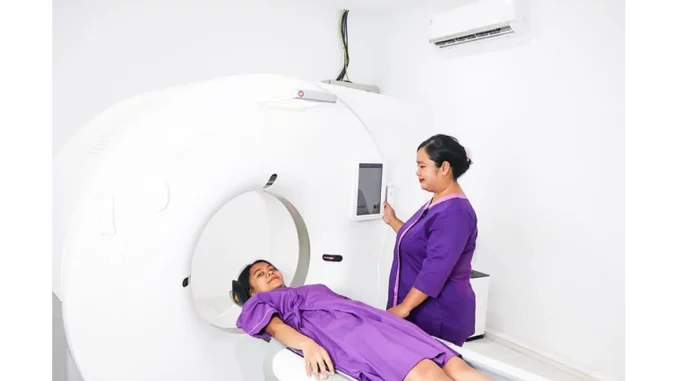
Nestled in the vibrant innovation hub of San Diego is CureMetrix, a forward-thinking company committed to revolutionising women’s healthcare through the application of state-of-the-art technology. To understand the impact of their work, I had the opportunity to converse with Dr. Emily Richards, a dedicated radiologist who collaborates closely with CureMetrix’s ground-breaking artificial intelligence (AI) tools.
Dr. Richards welcomed me into her office, where her enthusiasm for her work was immediately apparent. “I’ve always been intrigued by the intersection of technology and medicine,” she shared, surrounded by striking mammogram images that adorned the walls. “CureMetrix’s AI technology is truly transformative in our field.” The discussion quickly turned to one of the most pressing challenges facing radiologists: the overwhelming volume of data that must be meticulously analysed each day. “We often review hundreds of mammogram images daily,” Dr. Richards explained, “and the margin for error is slim. This is where AI becomes invaluable.”
The AI technology developed by CureMetrix, which has garnered FDA approval, assists radiologists by significantly enhancing the accuracy of mammogram readings. Dr. Richards detailed how this innovative tool serves as a reliable second pair of eyes, increasing the precision with which abnormalities are identified. “It’s akin to having a colleague who never tires and never misses a detail. It’s incredibly reassuring,” she remarked. The AI system is designed to pinpoint areas of concern within mammograms, allowing radiologists to direct their attention more effectively. “It’s not about replacing the human element in diagnosis,” Dr. Richards stressed, “but augmenting it. We still make the final decisions, but with AI, our choices are more informed.”
Dr. Richards shared a poignant story that underscored the profound impact of this technology. “There was a case not long ago,” she recounted, “where a small lesion was detected by the AI—something I had initially overlooked. It was early-stage cancer, and because we identified it so early, the patient had a much more favourable prognosis.” This human aspect of her work is something Dr. Richards deeply treasures. She spoke warmly about the relief and gratitude expressed by patients who benefit from early detection, often facilitated by the AI’s precision. “Knowing that we can offer women a better chance at overcoming cancer is immensely fulfilling,” she noted, her voice filled with sincere emotion.
Beyond cancer detection, Dr. Richards envisions vast potential for AI in other facets of women’s health. “The possibilities are endless,” she enthused. “With the right data, AI could aid in predicting and managing conditions like osteoporosis or cardiovascular diseases, which are particularly prevalent in women.” Our conversation naturally led to the ethical considerations surrounding AI in healthcare. Dr. Richards acknowledged the power of the technology but emphasised the importance of its responsible use. “There’s always the question of data privacy and the need for rigorous testing to ensure accuracy across diverse populations,” she explained. “CureMetrix is steadfast in its commitment to upholding these standards.”
As a respected figure within the medical community, Dr. Richards is acutely aware of the scepticism that can accompany technological advancements. “It’s natural to be cautious,” she conceded. “However, once individuals witness the tangible benefits, reservations often dissipate.” Her optimism about the future of healthcare is palpable. Dr. Richards envisions a landscape where AI and human expertise collaborate seamlessly to provide the highest standard of care. “It’s not about one or the other,” she asserted. “It’s about collaboration.”
As our discussion came to an end, I inquired what Dr. Richards hoped readers would glean from our conversation. After a moment of reflection, she responded, “I want people to understand that AI in healthcare is about empowerment—empowering doctors to make better decisions and empowering patients with better outcomes.” Dr. Richards’s insights offered a captivating glimpse into how AI is reshaping women’s healthcare, one mammogram at a time. Her unwavering dedication to her patients and her embrace of technology as a tool for improvement left me with a renewed sense of optimism about the future of medicine.
As I departed her office, I was inspired by the potential of AI to transform lives. CureMetrix, through its innovative approach, is indeed at the forefront of heralding a new era in healthcare—one where technology and humanity coexist harmoniously for the greater good.


Be the first to comment